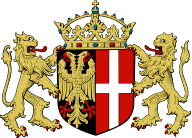
Cybele Baptistry
In 1956, a late-antique stone cellar was discovered during emergency excavations at the place known today as the Gepaplatz square in Neuss.
At the time, the building was thought to be a "Fossa sanguinis", a blood baptistery consecrated to the cult of Cybele.
During the Taurobolium - a bull sacrifice ritual - a priest of the Great Mother goddess Cybele from Asia Minor, descended into a pit, which was covered with a perforated wooden board. A bull was then slaughtered above him, and the blood of the animal flowed onto the priest promising him rebirth and eternal life.
From today's point of view this interpretation is questionable, as none of the Roman Cybele sanctuaries have such a baptistery.
Yet it is highly likely that the cellar had a "sacral" function. But its actual purpose is still left in the dark - whether it was Christian or a part of a pagean temple, for instance for the Rhenish Mother Goddess Sunuxal.
The cellar is built from reused Roman bricks which probably came from a nearby sanctuary: the walls contain an altar for the highest Roman God, bearing the wording Iovis Optimus Maximus (best and greatest Jupiter). What is unusual about the place are the opposing staircases and a small brick bench in the cellar which is a mere 1.80m wide. There is nothing of this kind known from Roman cellars.
The irregular masonry gives rise to the assumption that the installation was only built after 300 A.D., after the Franconian invasions had led to a rapid economic and technical decline in the Lower Rhineland. Coins which were found here give evidence to the fact that the cellar can only have been given up after 341 A.D.
But still over half a century after it was excavated, the "Cult Cellar" in Neuss remains unique and without any direct parallels so far.
Today, this cellar in the pavillon "Fossa Sanguinis", is situated at the Gepaplatz square in Neuss and belongs to the archaeological department of the Clemens-Sels- Museum.
Visits are possible from 10 a.m. to 6 p.m.
The key can be obtained from the family Heischkamp living right next to the museum, Gepaplatz 3, seven days a week.
However, it is advisable, to inform about your visit ahead:
Phone/Fax: +49(0)2131-120669
or: +49(0)2131-101203
Archaeological guided tours can also be arranged with the Clemens-Sels-Museum. Just call +49(0)2131-904141
